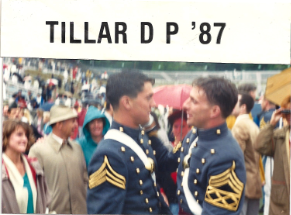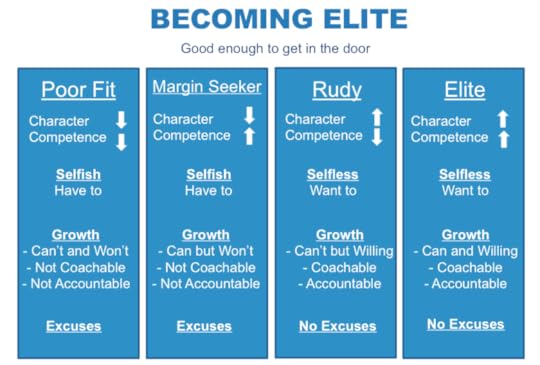Dave Anderson's Blog, page 7
August 8, 2017
Leadership Development Improves The Bottom Line
We don’t lack smart people in business these days. Smart people are everywhere. We lack leaders.
The latest studies are proving leadership equates to profits. Developing good leaders does more to effect the bottom line of an organization than hiring yet another top graduate from a famous school.

Leadership Development Is A Competitive Advantage
Yet credentials and expertise are what most companies focus their recruiting and training efforts on. Leadership development tends to be an optional activity, while skill development is sacred.
Spending time and resources developing leaders at all levels of an organization will do more to improve bottom line performance than any repetitive job specific training will.
New data is proving what many of us have believed intuitively.
One study of over 500 publicly traded companies and their leadership training expenditures found that the companies in top 50% in training spending had an 86% higher shareholder return than the bottom 50%.
Another study of 2,600 companies with over 12,500 leaders participating found that the companies with ineffective leadership development systems performed in the 24th percentile financially. While companies who had deliberate leadership development activities financial performance ranked in the 68th percentile.
Any organizations that develops leaders at all levels of the organization will have a clear competitive advantage over the competitor that continues to focus on only skill development.
The Bottom Line:
Intelligence is no longer a differentiator. Leadership is what separates the great organizations from the average ones.
While job specific skill training will help an organization maintain its position in the middle of the pack. Leadership training will cause that company to lead the pack.
In this economy, there is no lack of talented and skilled people in the marketplace. They are everywhere. Hiring skill or spending money on developing those skills that are already prevalent in the market will do little to change a company’s competitive position.
The time is now to begin the process to insure an organization’s future. A company that develops its current and future leaders has a competitive advantage over the competition.
Leadership is a competitive advantage that will not disappear with the advent of new technology.
Leadership is one area of training that is never going to be obsolete and will always improve the bottom line.
Question:
If your company has not spent money to develop your leadership, what are you doing on your own?
Dave Anderson is coauthor of the Amazon Best-Seller Becoming a Leader of Character – Six Habits that Make or Break a Leader at Work and at Home with his father General James L. Anderson (USA Retired).
You can order Becoming a Leader of Character on Amazon by clicking here:
You can also find Becoming a Leader of Character at Barnes and Noble, Books-a-Million and other retailers.
The post Leadership Development Improves The Bottom Line appeared first on Dave Anderson.

August 2, 2017
Compliant Teams Vs. Committed Teams
Playing within the rules is a given in business. But, the increased communication around compliance has a negative side effect. Compliance becomes a goal in and of itself. The implication is that if I have a compliant team, I am a successful leader. Not true.

Committed Teams Beat Compliant Teams
Recent conversations at multiple organizations prompted me to update this blog from June 2012.
Truly great teams are not built around compliance. To me, that means I have a team who follows the rules out of fear of punishment.
I want a team that is committed – not just compliant.
What’s A Compliant Team Look Like?
• Leaders are in fact just managing – The goal is to prevent mistakes.
• People don’t trust their subordinates or their leaders – It goes both ways, from the front-line to the C-suite.
• People wait for direction – People are unlikely to try new things without manager approval.
• Mistakes are punished – Therefore everyone plays it safe.
Compliant Team Results:
Compliant teams have unfulfilled workers. The Gallop Engagement survey year after year points out that 70% of all workers are not engaged. In other words, people on a compliant team work at a J-O-B.
As long as they don’t screw something up, they will collect their paycheck and go home. They are not engaged and can be actively disengaged.
What’s A Committed Team Look Like?
• Leaders are leading – Leaders are not acting as corporate watchdogs. They are strategizing and coaching for the future.
• Trust runs from the top down and vice versa – People believe in their leaders and the leaders believe in their people.
• Everyone is innovating – The message is, “If there is a better way, do it!”
• People embrace mistakes – Failure is embraced as part of the learning process.
Committed Team Results:
Job satisfaction is a given on committed teams. There is more trust and things get done without micromanagement. These committed teams outperform the compliant teams time and time again.
Committed Teams Are Engaged
The Gallup Survey does a great job of asking questions that can determine the commitment level of both leaders and employees.
Committed Leaders
There are 4 statements that can be asked of front line leaders that will determine their state of mind. If these 4 statements receive a negative response, it is likely these leaders feel they are leading from a place of compliance versus commitment.
• The mission and purpose of my company makes me feel like my job is important.
• The leadership of my company makes me enthusiastic about the future.
• At work, I have the opportunity to do what I do best every day.
• In the last six months, someone has talked to me about my progress.
If the front line leaders do not have a positive response to the statements above, I doubt they are leading in ways that create committed teams.
Committed Employees
Some of the statements on the Gallup Survey examine employees attitudes about the environment the leadership above them has created.
• In the last 7 days, I have received recognitions or praise for doing good work.
• There is someone at work who encourages my development.
• My supervisor creates an environment that is trusting and open.
• At work, my opinions seem to count.
The Bottom Line:
A compliant team functions out of a sense of fear while their leaders manage. Constant oversight versus innovative change are the priorities for leaders of compliant teams. An organization led with a compliant mindset is doomed to stagnate and be beaten by their committed competition.
When teams are characterized by leadership, trust, innovation, and productivity go up while turnover goes down. On committed teams, leaders are leading change instead of managing the status quo.
Question:
How has the best leader you know built a committed team versus a compliant team?
The post Compliant Teams Vs. Committed Teams appeared first on Dave Anderson.

July 18, 2017
Teamwork: A Navy SEAL’s Definition
Who doesn’t love the Navy SEALs? Answer: The enemy’s of freedom. But to the rest of us, these warriors are heroes. They are the elite of the elite. They understand teamwork and define it with simplicity.

Selfless acts towards a common goal.
I say I love the Navy SEALs even though I am an Army guy. The Army has Delta Force and the Navy has the SEAL Teams. One thing these two groups live by is the concept of teamwork.
A friend told me of a quote from a leadership boot camp he attended that was run by a former Navy SEAL.
The Definition of Teamwork
At this boot camp these business people were exposed to the military concept of teamwork. This definition should be how we all see and live teamwork.
Teamwork: Selfless acts towards a common goal.
These are simple, yet powerful words. There is no fluff in this definition. That is why it works. Often academics will take a concept and over complicate it.
It has been said that communicators take the complicated and make it simple. While educators take the simple and make it complicated.
The Navy SEAL who shared this concept with these business people was a communicator. Each word in this definition means something. Together they create a powerful message.
Selfless
In the military, loners are not welcome. By the end of my Beast Barracks at West Point I knew that I would never let my squad mates down. It was beyond the realm of possibility in my mind. The success of every military unit revolves around Selflessness.
To this day, I know I can rely on my West Point classmates if I am in need. They would drop everything to help me, and I would do the same for them.
Concern for inconvenience, personal discomfort, or personal agendas has no role on a team. The best teams have individuals who are selfless. The former SEALs who gave their lives to protect the American Ambassador in Libya gave us a vivid living example of Selflessness on September 11, 2012.
Acts
Actions, not words are what counts. I believe we all have implanted in us by our creator, the knowledge of right and wrong. Most of us will even go so far as to talk about what is right and wrong.
But without action, the knowledge and the words are worthless. The SEALs exemplify actions instead of words. Words do not accomplish a mission, save a hostage or safeguard our country.
If I claim to be selfless but rarely act selflessly, or if I claim to be working towards the same goal as my team yet my actions do not move my team closer to that goal, I am a hypocrite and not a worthy team member.
Towards
The teamwork the Navy SEALs exhibit is not characterized by random activity. Every action they take is meant to move them towards their goal.
Unfortunately, too many of us believe that being a busy and active member of a team is good enough. That attitude would have gotten me in trouble at West Point and kicked out of SEAL training.
If I am to be an effective team member, my actions must be focused on the desired results of the team. If I am not working towards something specific, I am filling a spot on the team that should be occupied by a person who is driven to move the team forward.
A Common Goal
The goals that matter on a team are team goals. Athletes more worried about individual stats, or business people only worried about their own department’s are a detriment to the team.
Once a common objective is laid out, a Navy SEAL does not care whether they are the one who gets to save the hostage, or they are the one operating the radio. The goal is the safety of that hostage. No role in that mission is more glamorous than the rest.
A common goal for an effective team transcends individual goals. For that to happen, the leader of that team must be sure all the team members understand the common goal.
The Bottom Line:
Selflessness is perhaps the most important element for an individual on a team. Once the individuals in the group begins to act selflessly, the goals of the team are within any team’s grasp.
The Navy SEALs are an elite team. I may be biased, but I believe West Point creates an elite group of team leaders. Both organizations will not allow individuals to be part of their team unless they buy into:
Selfless acts towards a common goal.
This is a great quote to apply to my work life. But, as I think it through it is a great quote to apply to my marriage as well.
Question:
Who have you allowed to remain on your team that does not embrace this concept of teamwork? Is that you?
Dave Anderson is coauthor of the Amazon Best-Seller Becoming a Leader of Character – Six Habits that Make or Break a Leader at Work and at Home with his father General James L. Anderson (USA Retired).
You can order Becoming a Leader of Character on Amazon by clicking here:
You can also find Becoming a Leader of Character at Barnes and Noble, Books-a-Million and other retailers.
The post Teamwork: A Navy SEAL’s Definition appeared first on Dave Anderson.

July 11, 2017
Finding Elite Team Members
Everyone wants to be part of an Elite Team and leaders want to lead Elite Teams. Leaders can push a lot of buttons and pull a lot of levers in an effort to make their team elite. But, the truly elite teams start with the right kind of team members.
Yes you have to hire the right people. It is critical to start with the right material. But sometimes the people we hire do not live up to the potential we saw in them.
When we begin to see those team members at work, they usually fall into four categories. It is critical for the leader to recognize which of these categories a team member is operating in and take action.
The Poor Fit Team Members
Though some people make it through the hiring process, they turn out to be a poor fit. When we recognize someone is a poor fit, the leaders need to remove that person from the team.
Low Competence: They were good enough to be hired, but their skills remain on the low end of the spectrum.
Growth: They don’t have the competence to grow beyond where they currently are.
Low Character: This appears in three ways.
Selfish: They contribute to the team because they have to.
Growth: They are not coachable and not accountable.
Excuses: They make excuses for their performance deficits.
It is obvious what needs to be done with the Poor Fit member of our teams. Do we have the Courage to do it?
The Margin Seeker Team Members
These are the potential all-stars who continue to dissappoint and do just enough to get by. When we identify the Margin Seeker, it’s time to establish consequences for them and follow through on those consequences.
High Competence: They are the most troubling members of the team, because they have the ability to do be elite.
Growth: They have the potential to make the changes and grow.
Low Character: The same three issues as the Poor Fit.
Selfish: They contribute to the team because they have to.
Growth: They are not coachable and not accountable.
Excuses: They make excuses for their performance deficits.
It is obvious what needs to be done with Margin Seeker member of our teams. Do we have the Courage to do it?
The Rudy Team Members
This is the person everybody loves. Just like in the movie Rudy, this team member has marginal abilities, but they will give it everything they have. If you have a Rudy, we need to keep them at the level where their skills still help the team. But, at the same time be willing to replace them if a more qualified person is ready to move into their role.
Low Competence: They were good enough to be hired, but their skills remain on the low end of the spectrum.
Growth: They don’t have the competence to grow beyond where they currently are.
High Character: They demonstate their character in three ways.
Selfless: They contribute to the team because they want to.
Growth: They are coachable and accountable.
Excuses: They do not make excuses for low performance. They own it and work to fix it.
Rudy is lovable and can make a strong contribution. But do we have the Courage to replace Rudy when an Elite Team Member is ready to take on Rudy’s responsibilities?
The Elite Team Members
This is the person the Navy SEALs and world class teams like the Golden State Warriors covet. When you have a team member like this, you want more of them. A leader that is blessed with a team full of elite people, never regrets letting go the Poor Fit, the Margin Seekers, or the Rudy’s.
High Competence: They are realizing their potential everyday. They have a high ceiliing and never stop reaching for it.
Growth: They have the potential to make the changes and grow.
High Character: They demonstate their character in three ways.
Selfless: They contribute to the team because they want to.
Growth: They are coachable and accountable.
Excuses: They do not make excuses for low performance. They own it and work to fix it.
The Bottom Line:
Most leaders want an Elite Team. But no matter how gifted the leader is, that team will not reach elite status unless the leader hires and builds his/her people into Elite Team Members.
It takes a Leader of Character to exercise the Courage needed to develop an Elite Team. If we are not leading an Elite Team, we need ask ourselves,
“Do I have Elite Team Members and am I prepared to do what it takes to have an Elite Team?”
Question:
What category does each of your team members fall into? Which category are you?
*Thanks to COL(Ret) Craig Flowers for the insights and partnership on this blog. @COLCraigFlowers
Dave Anderson is coauthor of the Amazon Best-Seller Becoming a Leader of Character – Six Habits that Make or Break a Leader at Work and at Home with his father General James L. Anderson (USA Retired).
You can order Becoming a Leader of Character on Amazon by clicking here:
You can also find Becoming a Leader of Character at Barnes and Noble, Books-a-Million and other retailers.
The post Finding Elite Team Members appeared first on Dave Anderson.

July 3, 2017
West Point’s Prayer for Leaders on July 4
Thirty-three years ago this week, I entered the United States Military Academy at West Point as part of the Class of 1988. That first week, we had to learn the West Point Cadet Prayer. This week the Class of 2021 began their journey as part of the “Long Gray Line”.

The Cadet Chapel at West Point
In honor of Independence Day and the men and women who serve so we can have the freedoms to speak and to pray as we see fit, I am publishing The West Point Cadet Prayer.
Before you read it, ask yourself: “What challenge does this prayer offer me?” Whether you are a person of faith or not, I think you will find a challenge meant for you.
Duty – Honor – Country. These are the three core values that West Point has stood for over the last two centuries. The West Point Cadet Prayer is used by graduates as a reminder of those values and other values that are meant to form the character our nation’s future leaders.
The West Point Cadet Prayer
“O God, our Father, Thou Searcher of human hearts, help us to draw near to Thee in sincerity and truth. May our religion be filled with gladness and may our worship of Thee be natural.
Strengthen and increase our admiration for honest dealing and clean thinking, and suffer not our hatred of hypocrisy and pretense ever to diminish.
Encourage us in our endeavor to live above the common level of life. Make us to choose the harder right instead of the easier wrong, and never to be content with a half truth when the whole can be won.
Endow us with courage that is born of loyalty to all that is noble and worthy, that scorns to compromise with vice and injustice and knows no fear when truth and right are in jeopardy.
Guard us against flippancy and irreverence in the sacred things of life. Grant us new ties of friendship and new opportunities of service. Kindle our hearts in fellowship with those of a cheerful countenance, and soften our hearts with sympathy for those who sorrow and suffer.
Help us to maintain the honor of the Corps untarnished and unsullied and to show forth in our lives the ideals of West Point in doing our duty to Thee and to our Country. All of which we ask in the name of the Great Friend and Master of all. Amen”
I repost this prayer every July 4th. Happy Independence Day!
Question:
How many different character challenges does this prayer present to leaders?
Dave Anderson is coauthor of the Amazon Best-Seller Becoming a Leader of Character – Six Habits that Make or Break a Leader at Work and at Home with his father General James L. Anderson (USA Retired).
You can order Becoming a Leader of Character on Amazon by clicking here:
You can also find Becoming a Leader of Character at Barnes and Noble, Books-a-Million and other retailers.
The post West Point’s Prayer for Leaders on July 4 appeared first on Dave Anderson.

June 27, 2017
Three Things a Mature Leader Knows
Which person in this picture is a mature leader? It may not be the one with gray hair. Age and experience have less to do with being a mature leader than some people think. The real key to being a mature leader has more to do with the leader’s ability to let go of their ego in three very telling ways.

Who is the Mature Leader?
Mature Leaders Know They are Fallible
An immature leader will not accept he is fallible. He has trouble admitting his mistakes. He ignores his weaknesses and expects others to do the same. And, he creates an atmosphere where his people are afraid to challenge him or his ideas.
The mature leader has the Humility to know he is not perfect. He has developed Humility as a Habit of Character by accepting that fact and owning his fallibility.
The maturity that comes from Humility allows him to take responsibility for his own mistakes and even laugh at himself. He does not see his mistakes as a sign of weakness, but as a sign of his humanity.
In response, he develops a team of followers that speak the truth to him and makes him better. A mature leader develops trust with his team because the team knows that a leader that is willing to make mistakes and learn from those mistakes will allow the team to do the same.
Mature Leaders Know They Have More to Learn
The immature leader believes that she has it all figured out. She may have been successful in this role or previous roles. Because of that, she believes that the way she has always done it will always work.
The mature leader again has the Humility to understand that a leader is never done growing and learning. She has made a habit out of seeking new ways to improve herself and her ability to lead others.
As a result, her team follows that leader’s example and innovates. They see failures as opportunities to learn. That team will not fall back on what has always worked. They will be a team that is always stretching and engaged in active problem solving.
Mature Leaders Know They are Dispensible
The immature leader believes he is the center of everything that happens on the team. As a result, he sets up an organization that makes him the hub of everything that happens. This creates a bottleneck because decisions must pass through the indespensible leader and thus kills initiative.
The mature leader exercises Humility by developing the people below him. He develops wise decision makers at all levels of the team so when he is not available, the team will function smoothly.
That means that when the mature leader takes vacation or is away at meetings, the team is not constantly sending emails or texts asking what to do or worse just waiting for the leader to return.
A team with a mature leader at the helm has leaders at all levels who are ready to step up and make decisions. The team is empowered to move forward because the leader believes he is not the reason the team will succeed, the people are.
The Bottom Line:
An immature leader can be 25 years old or 65 years old. An immature leader can have 5 months of experience or 25 years of experience. The key is not age or experience. The key is Humility.
When a mature leader develops Humility as a Habit of Character that leader –
Believes and acts like “It’s not about me.”
When a leader exhibits Humility by believing and acting like she is fallible, she has more to learn, and she is dispensable, the team follows that mature leader and becomes mature themselves.
My father, BG (RET) Jim Anderson once said to me,
“The mark of a real leader is what happens when he is not around.”
It takes a mature leader to create a team that is willing to make mistakes, learn from mistakes, and make their own decisions when it is appropriate.
Mature leaders create mature teams. It is the mature teams that most leaders want and the team’s maturity is a direct response to the maturity of the leader.
Question:
What are some other signs of a mature leader?
Dave Anderson is coauthor of the Amazon Best-Seller Becoming a Leader of Character – Six Habits that Make or Break a Leader at Work and at Home with his father General James L. Anderson (USA Retired).
You can order Becoming a Leader of Character on Amazon by clicking here:
You can also find Becoming a Leader of Character at Barnes and Noble, Books-a-Million and other retailers.
The post Three Things a Mature Leader Knows appeared first on Dave Anderson.

June 20, 2017
Teamwork Versus Integrity
Last week I observed two sales representatives at a local restaurant taking a company mandated knowledge test together. When someone asked what they were doing the answer was “Just exercising good teamwork.” Really? Is that what that was?
In my corporate days, individuals were consistently required to take online tests to confirm product knowledge, compliance regulations, and legal responsibilities. On many teams, these exams became group efforts.
At a certain point in my career, I stopped condoning that behavior from my team. Why? Because it was wrong!
Hypocrisy In the Name of Teamwork
The intent of those evaluations was never to test a group’s knowledge of the material. The group would not be put in situations where their product knowledge or their understanding of compliance and legal responsibilities were put to the test.
The real life tests happen to individuals. They do not happen in a group setting. This so called “teamwork” does not prepare anyone for the tests individuals will face.
In any other environment, this would be called cheating. The irony is these same adults would never condone these activities from their own children.
Child: “But Mom, we were just exercising teamwork!”
Parent: “Well that teamwork has just resulted in your driving privileges disappearing for a month!”
The hypocrisy of our actions at work can be astonishing when we look at the standards we hold our children to.
The Cost of Integrity
Integrity in 12 Words or Less
“Doing what is good and right and proper, even at personal cost.”
What is the personal cost to the individuals taking these tests?
Time: Required to study.
Individual Prestige: If my score is lower than the team average.
Leader Reputation: If his/her team scored below the company average.
The Cost of Teamwork without Integrity
The danger in situations where teams join together to game the system may not be immediately evident. But the damage done to individuals, teams, and the larger organization can’t be ignored.
What is the damage done when teams take these tests?
Individual: Pragmatism takes the place of Integrity.
Individual: Lying and cheating become easier each time we choose to compromise our Integrity.
Teams: What is allowed is condoned. The leader who turns a blind eye, is condoning lying and cheating on the team.
Teams: When Integrity is lacking, trust becomes a liability on a team instead of a strength.
Organizations: When individuals don’t really know the information they make decisions that put the whole company at risk.
The Bottom Line:
Each time we make a choice, it makes it easier to make that same choice again. That includes good choices and bad choices.
When we compromise our Integrity to save time or make things easier in the short run, we are setting ourselves up for a big fall when larger tests of our Integrity present themselves.
Are corporate sponsored tests a drag? Absolutely! But because something is mundane is a lousy reason for us to sacrifice our Integrity.
When we call this an exercise in teamwork, we are fooling ourselves. What we are actually exercising is poor judgement and hypocrisy.
Question:
Does teamwork really benefit when a group decides to cheat together?
Dave Anderson is coauthor of the Amazon Best-Seller Becoming a Leader of Character – Six Habits that Make or Break a Leader at Work and at Home with his father General James L. Anderson (USA Retired).
You can order Becoming a Leader of Character on Amazon by clicking here:
You can also find Becoming a Leader of Character at Barnes and Noble, Books-a-Million and other retailers.
The post Teamwork Versus Integrity appeared first on Dave Anderson.

June 13, 2017
Should Loyalty Trump Integrity
When President Trump purportedly asked FBI Director Comey for his loyalty, a shiver went down my spine. I wrote the following blog over 3 years ago. It’s amazing how the title and topic of this blog seem eerily prophetic. I also want to thank the President, the former Director and every politician in Washington for helping my book sales. It was not a bad time to publish a book on character.

Loyalty or Integrity?
Loyalty and Integrity are two character traits I think we all desire in ourselves and in others. I like loyal people. They are friends and co-workers I know I can depend on. It does not matter how bad the situation may be. I know I can count on the loyal people in my life.
I like people of Integrity as well. I like knowing I never have to question their words, actions, or motives. What you see is what you get. Their Integrity makes trusting them easy.
But should loyalty ever trump Integrity? Is there a time when that is appropriate?
Intellectually, most of us would argue that Integrity should always come first. Unfortunately that does not always happen. Here is a short list of when people put loyalty before Integrity:
When Loyalty Has Trumped Integrity
Loyalty To Individuals
Previously honorable Germans who’s allegiance to Hitler allowed him to slaughter millions.
Charles Colson and other aides to Richard Nixon as they manipulated the 1972 election resulting in Watergate.
Loyalty To Institutions
Politicians when they use half-truths or attack opponents in order to win public support for their policies.
Professors, coaches and players at University of North Carolina when they allowed athletes to take fake classes to help GPA’s.
The list above is short, and I am sure some people think I am being overly dramatic. But, let’s look at when we might be tempted to put loyalty before our Integrity.
Loyalty’s Temptations
When we see a friend cheating on a test in high school or college.
When our best friend at work asks us to omit some details in a report that may make him look bad.
When our child asks us not to tell our spouse about something they did.
When the best boss we ever had asks us to delay turning in some expenses until the start of the new budget cycle so he can come in under budget.
When our best friend asks us to be silent about his mistress.
When our spouse wants to avoid reporting some income to the IRS.
What Would You Do?
It is easy in a blog post to say I would never succumb to any of these temptations. But, I have. Unfortunately, I am not alone. Many people have let loyalty take the lead over Integrity.
The issue in these cases is Courage. Do I have the Courage at the moment to do what is right?
Integrity Stands Above Loyalty
In a world full of things I cannot control, my Integrity is one of the few things I have 100% control over. I always have a choice.
The choices are not easy. But there is always a choice – Defend my Integrity or sacrifice it.
The Cadet Honor Code at West Point states:
A cadet will not lie, cheat or steal nor tolerate those who do.
The clause on toleration is a direct reflection on how strong a pull loyalty is. At West Point, Integrity was to stand above loyalty. If I chose loyalty above Integrity, and did not turn in a friend who cheated on a test, I was just as guilty as he was.
Any cadet who chooses loyalty to a friend over Integrity faced expulsion along with his cheating friend. In the beginning for many cadets, this lesson was the hardest implement.
The Bottom Line:
For most West Point graduates, that lesson in loyalty and toleration was a defining one in the honing of our character. It was a difficult pill to swallow then, and it still is to this day.
Unfortunately, some West Point graduates, including me, have allowed loyalty to to trump Integrity.
The lesson in those cases is – we are all vulnerable to this trap.
Integrity stands above loyalty when it comes to essential character traits for all of us. We have to recognize the damage we do to our character whenever we allow loyalty to be our #1 priority.
The question we must all ask ourselves when we are tempted to put loyalty first is:
“How much do I value the most important and most controllable thing in my life?”
My Integrity
We can all look at President Trump and Mr. Comey and use them as examples to debate Loyatly vs. Integrity. But, we should all start by looking in the mirror and examining our own actions before we throw stones.
Question:
Do you think there is ever a time loyalty should trump Integrity?
Dave Anderson is coauthor of the Amazon Best-Seller Becoming a Leader of Character – Six Habits that Make or Break a Leader at Work and at Home with his father General James L. Anderson (USA Retired).
You can order Becoming a Leader of Character on Amazon by clicking here:
You can also find Becoming a Leader of Character at Barnes and Noble, Books-a-Million and other retailers.
The post Should Loyalty Trump Integrity appeared first on Dave Anderson.

June 6, 2017
Pride and Insecurity are Linked
“What will they think of me?” That is the question insecure people always ask themselves. I ask, “What makes you believe people are thinking about you?” That is how pride and insecurity are linked. We think others are focused on us.

Insecurity
Many people believe pride only rears its ugly head when someone boasts, won’t admit mistakes, or refuses to hear criticism. Those are indeed tell tale signs of pride. But, insecurity is also a form of pride.
Insecurity stops people from moving ahead. It cripples their progress and the progress of the people they are supposed to be leading.
Answering Insecurity
Whenever I coach someone who allows themselves to be overwhelmed by what other people think of them, I chalk it up to a strange form of pride.
The insecure person may say –
What will she think of me?
What will people say?
What if I am wrong and people find out?
The question I ask them at that moment is:
What makes you think people are thinking about you?
What People Are Really Thinking
Insecurity is a perverse form of pride because we assume everyone else is focused on us. THEY AREN’T. We are making ourselves out to be much more important to them than we actually are.
The truth is, most people are not spending that much time thinking about other people. They have their own lives and concerns that occupy a majority of their time.
This is where fear and pride intersect and create insecurity. We believe everyone is thinking about us, and we are scared of what those thoughts may be.
I understand that there could be many psychological reasons for an individual to be overwhelmed by insecurity. I am not trying to diminish the impact someone’s past can have on their perception of how the world sees them.
But really, most of the world is not spending that much time thinking about us.
It is our twisted pride that makes us think they are spending as much time thinking about us as we are!
The Bottom Line:
Insecurity is a habit that often starts with pride which then creates fear. This powerful combination of pride and fear can incapacitate an otherwise gifted and talented individual.
To defeat pride, we must exercise Humility and realize we are not the center of other people’s existence.
To defeat fear, we must exercise Courage and face our fears. We must do the things we are afraid to do. That is the only way to defeat fear.
Pride and insecurity occupy two sides of the same coin. When we ask “What will they think of me?” we are assuming other people are as interested in us as we wish them to be.
The truth is, they may be wondering the same thing about us. And then we are all stuck in a pattern of insecurity that prevents us from becoming the people are families, our teams and our society needs us to be.
Question:
When has insecurity kept you from stepping forward?
The post Pride and Insecurity are Linked appeared first on Dave Anderson.

May 29, 2017
A Tribute: To A Fallen Friend And Hero
My best friend, Donnie Tillar convinced me to go to West Point. He was a year older than I was. Thanks to his persuasiveness I joined my childhood friend as part of the Corps of Cadets. This is a Memorial Day tribute to Donnie.
This is worth reposting annually.

Donnie And Dave Graduation Day
A Memorial Day Tribute
In February of 1991, Donnie’s Blackhawk helicopter was shot down in the last hours of Operation Desert Storm. It took a few weeks before I got the word in a letter from my father. We did not have email then.
I kept a journal while I was part of Operation Desert Storm. Below is an entry from my journal on March 14th, 1991. I was a young, brash and broken 25 year old 1st Lieutenant in the Field Artillery when I wrote this.
I read this journal entry at a memorial service I organized with some high school friends. The only other time I have shared this was at a Veteran’s Day Chapel service at my kids school.
I now share it every Memorial Day Weekend here. Memorial Day is a day reserved for our men and women who have died in service to our country. It is a day to thank those men and women and their families who have sacrificed so much so you and I have the freedoms we enjoy.
Day 151 In Country 14 March 1991
Today I cried, I screamed, I shook and a part of me died. I got a letter from Dad telling me that Donnie Tillar had been killed when his Blackhawk was shot down over Iraq. The details are sketchy as to when and what mission he was doing.
I’m just so shook up by the whole incident. Donnie and I go back to 7th grade. We were inseparable. He’s the closest I ever came to having a brother. Dad said he learned in Vietnam that it was always the best ones who got hurt. Now I know the true cost of war.
In a way, I idolized Donnie. He could accomplish anything he wanted to. He was the best athlete I ever knew. He could play any sport. He was smart. He made Dean’s List constantly at West Point without really seeming to try. He could dance. Man could he dance. The ladies loved him. I loved him. I still do.
When I heard, I couldn’t stop sobbing. I grabbed my Walkman and walked about 2 KMs. Then for about an hour and a half I just walked in circles. I yelled, I cried, and I sang. I was listening to the Rolling Stones Hot Rocks. Donnie loved The Stones. I sang at the top of my lungs, by myself in the middle of the Arabian Desert. I talked to Donnie.
After a while, my mind turned to our adventures together. I began to smile. Then I found myself laughing and crying at the same time. If that is possible.
I returned to my vehicle in a state of numbness. But I began to tell everyone and anyone, Donnie and Dave stories. They just came flowing out of me. When Donnie and I got his parents’ car stuck in the snow ON TOP OF THE SKI SLOPE. Donnie and I driving away on his motorcycle with a case of champagne after work at the Hotel Thayer. Donnie and my trips to Stowe skiing and the hell we put his Dad through. And, the story about whenever we’d go out Mrs. Tillar would roll her eyes when she found out he would be with me, while my mother did the same when she knew I’d be with him.
Now the beat goes on. I’ll be telling people about my best friend Donnie Tillar for the rest of my life. My first son will be named after a true hero and a true friend. Donaldson Preston Tillar III.
I am going to have a party for him. In his honor, I want to gather his old friends and old loves together for a big blowout. He’d love to be there. But, he’ll be in a much better place. All we can do is raise our glasses and drink a couple for a man who touched all of us. A man with a penchant for fun. A man we will all miss. A man I will fondly remember as the brother I never had.
Post Script:
I have a 20 year old son named: James Donaldson Anderson. He and his twin sister were born 6 years to the day (March 14, 1997) after I originally wrote this journal entry.
In November 2012, Donnie’s younger sister Lani got married. I had the honor of officiating her wedding and being with her whole family. Donnie was there too. We all felt him.
Remember our fallen heroes and their families. Not just on Memorial Day, but every day in your prayers.
The post A Tribute: To A Fallen Friend And Hero appeared first on Dave Anderson.






